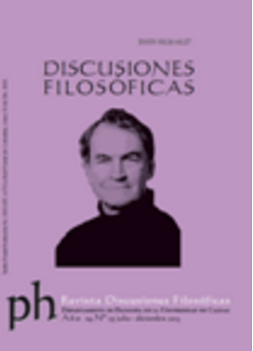Authors
Abstract
The search for the causes of the armed social conflict and its diverse violences in Colombia remains the predominant tendency in the academic literature dedicated to the analysis of various aspects of the Colombian armed conflict and its social, cultural and political expressions. Although it has been a commonplace to refer to the 'structural causes' or 'objective causes' and 'underlying causes' to explain the armed conflict and its related violences, some authors have questioned the coherence of such concepts. Nevertheless, the article suggests that these are important concepts and that, although it is necessary to scrutinize them critically, they can still be used, with some philosophical and theoretical caveats, to illuminate certain aspects of the armed social conflict in Colombia. With the aim of casting light upon the notion of structural/objective causes and its potential usefulness, the article analyses two classic studies of the causes of political and social violence in Colombia: La violencia en Colombia and Colombia: violencia y democracia.
References
Deas, Malcolm. Intercambios violentos. Reflexiones sobre la violencia política en Colombia. Bogotá: Taurus/Pensamiento, 1999. Impreso.
Fals Borda, Orlando. El problema de cómo investigar la realidad para transformarla por la praxis. Bogotá: Tercer Mundo Editores, 1994. Impreso.
Fay, Brian and Donald J. Moon. “What would an adequate philosophy of social science look like? Martin, Michael y Lee C. McIntyre. Readings in the Philosophy of Social Science. Cambridge, Massachusetts: MIT Press, 1994. Print.
Giraldo, Javier s.j. Guerra o democracia. Bogotá: Fundación para la Investigación y la Cultura, 2003. Impreso.
González, Fernán E., Bolívar, Ingrid J. y Teófilo Vásquez (eds.). Violencia política en Colombia: de la nación fragmentada a la construcción del Estado. Bogotá: CINEP, 2002. Impreso.
Guzmán Campos, Germán, Fals Borda, Orlando y Eduardo Umaña Luna. La violencia en Colombia, Tomo I. Bogotá: Taurus, 2005. Impreso.
---. La violencia en Colombia, Tomo II. Bogotá: Taurus, 2005. Impreso.
Harvey, David. “Population, Resources, and the Ideology of Science”. Economic Geography. Jul. 1974: 256-277. Print.
Hylton, Forrest. Evil Hour in Colombia. London: Verso, 2006. Print.
Jacoby, Tim. Understanding Conflict and Violence. Theoretical and Interdisciplinary Approaches. Abingdon: Routledge, 2008. Print.
MacIntyre, Alasdair. “The idea of a Social Science”. Against the SelfImages of the Age. Essays on Ideology and Philosophy. London: Duckworth, 1971. Print.
---. Whose Justice? Which Rationality? Indiana: University of Notre Dame Press, 1988. Print.
---. Tras la virtud. Madrid: Biblioteca de Bolsillo, 2001. Impreso.
Mészáros, István. “Ideology and Social Science”. Socialist Register. 1972: 35-81. Print.
Miall, Hugh, Ramsbotham, Oliver, Tom Woodhouse. Contemporary Conflict Resolution: The Prevention, Management, and Transformation of Deadly Conflicts. Oxford: Polity Press, 2005. Print.
Montenegro, Armando y Carlos Esteban Posada. La violencia en Colombia. Bogotá: Alfaomega, 2001. Impreso.
Orozco, Iván. Sobre los límites de la nueva conciencia humanitaria: dilemas de la paz y la justicia en América Latina. Bogotá: Temis/Universidad de Los Andes, 2005. Impreso.
Ortiz, Carlos Miguel. “Historiografía de la Violencia”. Archila Neira, Mauricio et al. La historia al final del milenio: ensayos de historiografía colombiana y latinoamericana. Bogotá: Universidad Nacional, 1995. Impreso.
Palacios, Marco y Frank Safford. Colombia: país fragmentado, sociedad dividida. Su historia. Bogotá: Grupo Editorial Norma, 2002. Impreso.
Parsons, Talcott. The Social System. Glencoe, Illinois: The Free Press, 1951. Print.
---. The Structure of Social Action. Volume I & II. Glencoe, Illinois: The Free Press, 1967. Print.
Pizarro León Gómez, Eduardo. Insurgencia sin revolución: la guerrilla en Colombia en una perspectiva comparada. Texas: Universidad de Texas, 1996. Impreso.
Ramírez Castro, Juana. “¿Desde qué presupuestos se estudia la violencia en Colombia? Entre las convicciones y la realidad cotidiana de su elección”. Co-Herencia. Jul-Dic. 2010: 69-93. Impreso.
Ramsbotham, Oliver. Transforming Violent Conflict: Radical Disagreement, Dialogue and Survival. Abingdon: Routledge, 2010. Print.
Rubio, Mauricio. “Rebeldes y criminales. Una crítica a la tradicional distinción entre el delito político y el delito común”. Arocha, Jaime, Cubides, Fernando y Myriam Jimeno. Las violencias: inclusión creciente. Bogotá: Universidad Nacional, 1998. Impreso.
Sánchez, Gonzalo, Arocha, Jaime, Camacho G., Álvaro, Fajardo M., Darío, Guzmán B., Álvaro, Andrade A., Luís Alberto, Jaramillo, Carlos Eduardo et al. Colombia: violencia y Democracia. Bogotá: Universidad Nacional/COLCIENCIAS, 1988. Impreso.
Sanders, James. Contentious Republicans. Popular Politics, Race, and Class in Nineteenth-Century Colombia. Durham/London: Duke University Press, 2004. Print.
Taylor, Charles. “Neutrality in Political Science”. Martin, Michael y Lee C. McIntyre. Readings in the Philosophy of Social Science. Cambridge, Massachusetts: MIT Press, 1994. Print.
Uribe Botero, Ángela. “Berito Cobaria: ¿El Otro de la Inclusión Discursiva?” Sierra Mejía, Rubén y Alfonso Gómez-Müller (eds.). La Filosofía y la Crisis Colombiana. Bogotá: Taurus, 2002. Impreso.
Valenzuela, Pedro. “Reflexiones sobre interpretaciones recientes de la violencia en Colombia”. Seminario sobre Pobreza y Violencia en Colombia. Universidad de Uppsala, Suecia, 28 de noviembre de 2001.
Winch, Peter. The Idea of a Social Science. London: Routledge, 1958. Print.
Zuleta Pardo, Mónica. “La Moral de la Crueldad”. Nómadas. Oct. 2010: 13-29. Impreso.

 PDF (Español)
PDF (Español)
 FLIP
FLIP

























